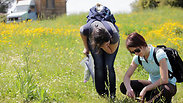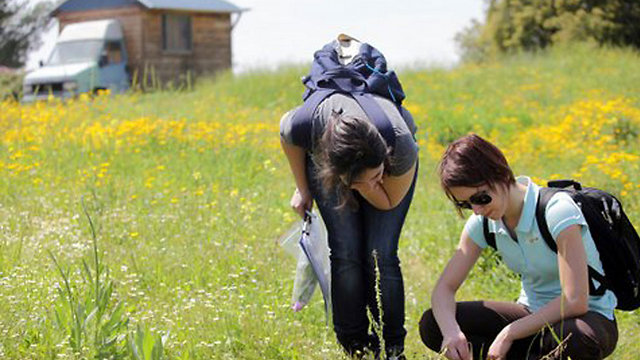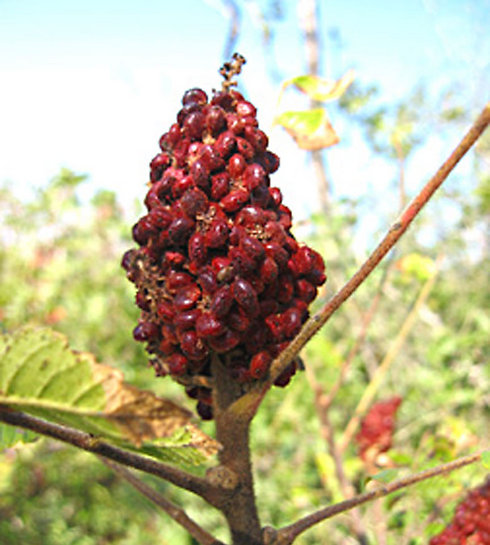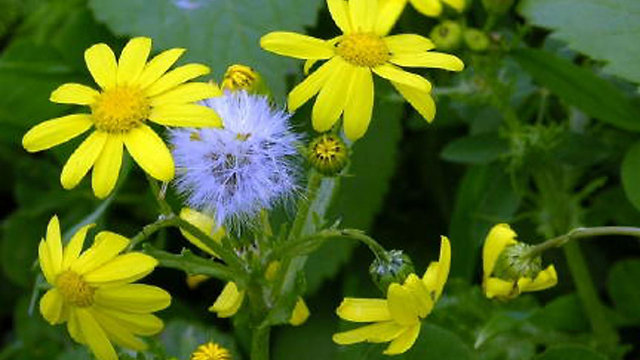
Israeli-Palestinian study finds regional flowers help combat viruses
Three-year study conducted by Israeli, Palestinian, Spanish and Greek researchers examined various flowers and plants in Israel and found potential for use in pharmaceutical and cosmetic industries.
A three-year international study, in which Israeli, Palestinian, Spanish and Greek researchers took part, yielded new findings about medicinal plants that have the potential to be used in the pharmaceutical and cosmetic industries.
As part of the study, researchers gathered plants from different regions in Israel - such as Jerusalem, Mount Hermon, the Hula Valley, Netanya and Palmachim beach, the Dead Sea - and Nablus in the Palestinian Authority, and found that the plants have the ability to aid in treatment of diabetes, infections, and viruses as well as are useful for cosmetic use.

The researchers found that the Pistacia lentiscus plant, a small tree of the pistachio genus, and the Cistus flower, were effective in treating various viruses.
Likewise, sumac, a flower that is commonly used as a spice in the Middle East, and rhus coriaria, known as Sicilian sumac, were also found to aid in the treatment of viruses. Using the leaves of the plants to make tea or even consumption of the plants were found to help treat viruses, according to the study.

The senecio flower, a genus of the daisy family which can be found in almost every field in Israel, was found to aid in treatment of type 2 diabetes, according to the research. Individuals with the illness who drank tea made from the senecio flower had seen an improvement in their condition.

Other plants researchers found to be effective in treating diabetes were stachys aegyptiaca, marram grass, and sonchus oleraceus.
The tamatix nilotica tree, commonly found in the Negev region in southern Israel, was found to help combat fungus. The bold-leaf launaea and the golden samphire were also found to be effective in combating fungus.
For infection, the anemone coronaria, pistacia atlantica, and viburnum tinus flower were found the most effective.
Another interesting find by the researchers - A flower picked near the Western Wall in Jerusalem called the capparis spinosa was found to be useful in the treatment of intestinal worms.
The rare collaboration between researchers, led by President of Hadassah College, Professor Berthold Friedlander, and Dr. Gili Joseph, received 2 million Euros in funding from the European Union as part of a project encouraging cooperation between various regions surrounding the Mediterranean.
The project was selected from a batch of 700 applications sent to the European Union and included the participation of the Biodiversity and Environmental Research Center located in Nablus in the Palestinian Authority, the Hellenic Regional Development Center from Greece and Leitat Technological Center from Spain as well as the Hadassah College in Jerusalem, which led the study. The study was also aided by researchers from the US.
Prof. Friedlander, who headed the study, said: "The study of plants for medicinal purposes was the prime goal, but the cooperation with the researchers from the Palestinian Authority and from the rest of the nations was no less important. The mutual understanding, joint endeavor and the yearning to deliver results, which was important to both nations, helped bring the final result."
According to Prof. Friedlander, he and his colleagues were surprised by "how much the project connected the participants from all corners of academic research."
"We are proud and grateful we were able to head it," said the professor from Hadassah College.
The results of the study are still raw but the researchers say that the results will form the basis for further research in order to bring them to use in the medical industry within a few years.










